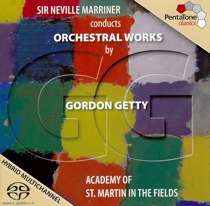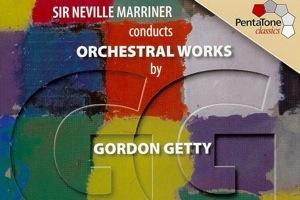
Judging from their playing, which pours forth freely in one melodic stream after another, Sir Neville Marriner and the Academy of St. Martin in the Fields must have relished their assignment. Their recent multichannel SACD sampler of orchestral music by Gordon Getty (b. 1933), released by Pentatone, is a joyful experience, overflowing with lovely, richly scored pieces.
Happily, Getty (also a founder of San Francisco Classical Voice)was able to secure one of the best possible sonic showcases for his music. Recorded by Polyhymnia using the DSD (Direct-Stream Digital) recording process developed by Sony, the sound, even in two-channel, is so far superior to almost every conventionally recorded orchestral or instrumental disc I’ve reviewed for SFCV in the past year as to raise the question, Why don’t other record companies take advantage of this technology? The sense of orchestral depth and resonance in what seems like a large concert hall — in reality, Air Lyndhurst Studios, Hampstead, London — is demonstration-class.
Getty’s potpourri begins with the 12-minute Overture to Plump Jack, a two-act opera that the San Francisco Symphony premiered in a concert production in 1987. Since played by major orchestras in Los Angeles, London, Spoleto (Italy), Aspen, Puerto Rico, New Mexico, and Mazatlán (Mexico), the opera depicts the Falstaff of Shakespeare’s Henry IV and Henry V.
Listen to the Music
Homework Suite: Berceuse
Getty himself writes, “The overture is a synopsis of the story, quoting scenes of Falstaffian high jinks and of courtly grief by turn, along with a few idyllic episodes, interrupted by occasional distant fanfares warning of the banishment.” It certainly has its share of rollicking moments, as well as lusher other moments that bring to mind the tone poems of Richard Strauss.
Jumping ahead two decades, the 12-movement Ancestor Suite is a recent ballet score. Premiered in Moscow in September 2009 by the Russian National Orchestra, the music is loosely based on Edgar Allen Poe’s Fall of the House of Usher. You’ll be hard put, however, to find the sinister menace and horror we associate with Poe reflected in this music. It is far more the music of fairy tales, of characters waltzing and waltzing until they can waltz no more. To single out but two of the movements, the lovely loneliness of “Madeleine” and the wistfulness of “Ewig Du” are especially gratifying.
The remaining shorter works on the program are dominated by the five-movement Homework Suite. Initially composed for solo piano in 1964, when Getty was studying music theory at the San Francisco Conservatory of Music, it includes a short “Berceuse” that I find irresistibly sweet.
As the disc ends with Raise the Colors, a lively C-major march for winds and percussion, the overriding impression of sometimes-jovial loveliness remains. Getty’s is the kind of music that, were you to hear it on KDFC-FM while driving, you’d be tempted to pull over and call the station to ask what you heard and where you can buy it. Listening to this disc would be a genial way to spend the afternoon.

